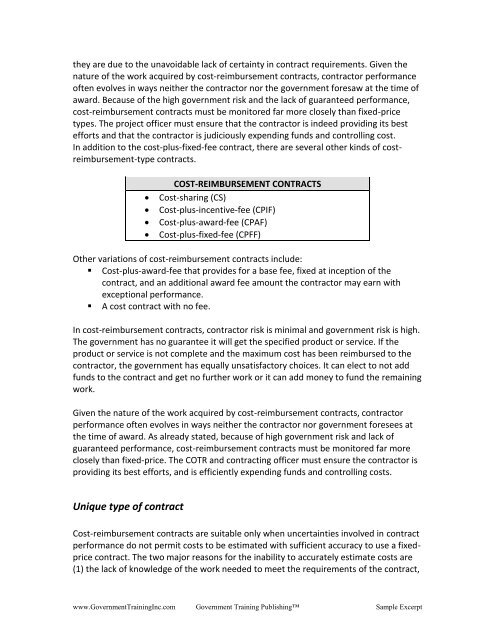Managing Cost Reimbursable Contracts - Government Training Inc.
Managing Cost Reimbursable Contracts - Government Training Inc.
Managing Cost Reimbursable Contracts - Government Training Inc.
Create successful ePaper yourself
Turn your PDF publications into a flip-book with our unique Google optimized e-Paper software.
they are due to the unavoidable lack of certainty in contract requirements. Given the<br />
nature of the work acquired by cost-reimbursement contracts, contractor performance<br />
often evolves in ways neither the contractor nor the government foresaw at the time of<br />
award. Because of the high government risk and the lack of guaranteed performance,<br />
cost-reimbursement contracts must be monitored far more closely than fixed-price<br />
types. The project officer must ensure that the contractor is indeed providing its best<br />
efforts and that the contractor is judiciously expending funds and controlling cost.<br />
In addition to the cost-plus-fixed-fee contract, there are several other kinds of costreimbursement-type<br />
contracts.<br />
<br />
<br />
<br />
<br />
COST-REIMBURSEMENT CONTRACTS<br />
<strong>Cost</strong>-sharing (CS)<br />
<strong>Cost</strong>-plus-incentive-fee (CPIF)<br />
<strong>Cost</strong>-plus-award-fee (CPAF)<br />
<strong>Cost</strong>-plus-fixed-fee (CPFF)<br />
Other variations of cost-reimbursement contracts include:<br />
• <strong>Cost</strong>-plus-award-fee that provides for a base fee, fixed at inception of the<br />
contract, and an additional award fee amount the contractor may earn with<br />
exceptional performance.<br />
• A cost contract with no fee.<br />
In cost-reimbursement contracts, contractor risk is minimal and government risk is high.<br />
The government has no guarantee it will get the specified product or service. If the<br />
product or service is not complete and the maximum cost has been reimbursed to the<br />
contractor, the government has equally unsatisfactory choices. It can elect to not add<br />
funds to the contract and get no further work or it can add money to fund the remaining<br />
work.<br />
Given the nature of the work acquired by cost-reimbursement contracts, contractor<br />
performance often evolves in ways neither the contractor nor government foresees at<br />
the time of award. As already stated, because of high government risk and lack of<br />
guaranteed performance, cost-reimbursement contracts must be monitored far more<br />
closely than fixed-price. The COTR and contracting officer must ensure the contractor is<br />
providing its best efforts, and is efficiently expending funds and controlling costs.<br />
Unique type of contract<br />
<strong>Cost</strong>-reimbursement contracts are suitable only when uncertainties involved in contract<br />
performance do not permit costs to be estimated with sufficient accuracy to use a fixedprice<br />
contract. The two major reasons for the inability to accurately estimate costs are<br />
(1) the lack of knowledge of the work needed to meet the requirements of the contract,<br />
www.<strong>Government</strong><strong>Training</strong><strong>Inc</strong>.com <strong>Government</strong> <strong>Training</strong> Publishing Sample Excerpt






